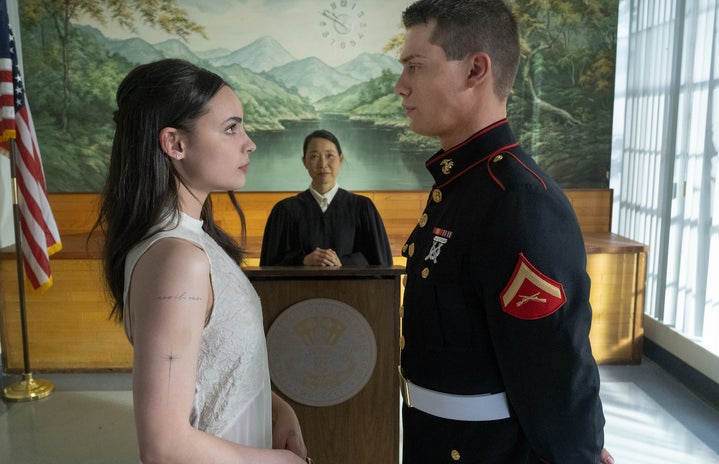In July, Netflix released new romance movie Purple Hearts. Starring Sofia Carson (Descendants) and Nicholas Galitzine (Cinderella),the movie follows an aspiring singer who marries a Marine for healthcare and financial benefits, but they later fall for each other on a deeper level. Sounds like your typical “fake relationship” trope.
Numbers don’t lie. Purple Hearts is currently one of Netflix’s most streamed projects. “Come Back Home,” the song Carson sings for the movie, has over 5 million YouTube views.
Many viewers are taking to social media to express their love for the movie. Fans are also praising Carson’s performance, and a sequel might even be in the works.
However, the positive reception isn’t universal. The movie has faced considerable controversy that Carson herself even addressed. Why is a seemingly problematic movie becoming so popular? Here’s a rundown on Purple Hearts, why it’s facing backlash, and what the cast and crew had to say.
Purple Hearts’s problematic themes has sparked backlash among gen z.
From healthcare, to military propaganda, to outright racism, Purple Hearts certainly covers a lot of topics, but gives none of them the nuance they deserve.
First off, Carson’s character Cassie has type 1 diabetes, but she can’t afford her medication. She agrees to marry Marine Luke for his health insurance plan and military spouse stipend. Though she’s a liberal musician and he’s a conservative soldier, they bond through time, and the “red heart” and the “blue heart” turn — wait for it — purple.
The political themes in Purple Hearts were actually much more explicit in its early stages. The movie was initially billed as a true “liberal/conservative fake dating” scenario, but it was rebranded after an unenthusiastic reception. But even after the rebrand, viewers were not pleased, calling the movie racist military propaganda that undermines the actions of the military. One TikTok user even called out the way the movie undermines Cassie’s feminist views by having her fall for Luke’s “charm.”
Cassie, like Carson herself, is also Latina, and it hasn’t sat right with certain viewers how the “enemies to lovers” trope hinges on Cassie being a minority liberal with Luke being a conservative soldier. Plus, the dynamic between her and the military men is uneven, with them mostly ganging up on her. Rather than being a “compromise” their two political stances like the movie claims, Purple Hearts’s ending seems more like Cassie giving up her morals for Luke.
Another Twitter user points out how Purple Hearts so casually uses the absurdity of the American healthcare system in order to move the plot forward. In other words, Cassie’s situation reflects the grim reality of many Americans who can’t afford healthcare, but the movie doesn’t give it a second thought, instead using it as fodder for a romcom trope.
One line in particular has garnered a lot of backlash: At one point, one of Luke’s military friends played by Nicholas Duvernay talks about “hunting down some goddamn Arabs.” This is undoubtedly racist and xenophobic, but it wasn’t given any real contextual weight. It was a completely unnecessary moment, as pointed out by many viewers online.
Sofia Carson and director Elizabeth Allen Rosenbaum defended Purple Hearts.
Criticism of Purple Hearts is gaining traction. Naturally, Sofia Carson rushed to defend her latest project. She told the Hollywood Reporter that Purple Hearts hopes to show what happens when two people of contrasting views “lead with love.” Furthermore, director Elizabeth Allen Rosenbaum also responded to the criticism, saying that the country “is very flawed at the moment” and that she hopes the movie pushes people to be more moderate.
American politics are becoming increasingly polarized as the American right moves to Christian nationalism. Thus, it’s not surprising that many people online thought both Carson and Allen Rosenbaum’s defenses were out of touch, particularly to defend a love story. One Twitter user criticized undermining the movie’s problematic elements for the sake of the romance. Another user called out the lack of critical thinking skills involved in the consumption of Purple Hearts.
Overall, Netflix’s newest romance seems to have missed the mark. The romance next to the watered-down political commentary doesn’t sit right, and Sofia Carson and Elizabeth Allen Rosenbaum’s comments aren’t helping the situation. Perhaps in the wake of consequential Midterm Elections, “can’t we all just get along?” doesn’t really work as a rousing political statement anymore.


